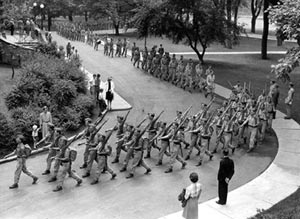This week, an actuarial analysis compiled by Veterans’ Ombudsman Guy Parent revealed some disturbing findings about the New Veterans Charter and its deficiency in meeting the needs of its 1428 permanently incapacitated veterans.
In 2006, the Pension Act was replaced by the New Veterans Charter. The federal government optimistically proposed it as an improvement on the historical policy that administers benefits to veterans. One of the main changes is the addition of a lump sum cheque allocated to compensate for hardship as a result of impairment and disability. In the past, under the Pension Act, the majority of the compensation was distributed on a lifelong monthly basis. In more general terms, the NVC intends to shift the focus away from providing compensation to veterans and also puts more of an emphasis on establishing overall well being.
The 2006 plan has so far gained significant disapproval from veterans and their advocates. Parent’s analysis found that young veterans who have returned from serving in Afghanistan are the ones most impacted negatively by this policy. These individuals are far worse off as a result of their service to the country compared to veterans of WWII and the Korean War, whose benefits were administered under the more generous Pension Act. However, it’s not only the young who are affected; the government is learning that it can be quite difficult to explain how they are contributing to the well being of aging veterans by restricting their payments once they reach the age of retirement.
Another striking difference is that injured veterans need to pay tax on the income they receive. That is—if they receive any compensation at all. About 28 percent (or 406) veterans do not qualify for any assistance under this scheme. These individuals are slipping through the cracks in society as they are being neglected by the country they fought for. Individuals who fall into this category come from a number of different backgrounds. For example, older Veterans with fewer years of service and more moderate disability levels would not qualify for allowance supplements and only minimal pension.
Parent’s report urges the government to re-evaluate the NVC before it ends up paying a much higher price in human life. The government has been receptive to these findings and has always expressed its willingness to continually modify the NVC. However, it’s doubtful that change will come fast enough to improve the quality of life for the veterans who are most adversely affected before it’s too late.




